KMGT 633 - Analyzing the Future of Leadership: Theory & Practice
VerifiedAdded on 2023/06/08
|5
|1012
|405
Essay
AI Summary
This essay delves into the future of leadership by examining various leadership theories such as trait theory, behavioral theory, contingency theory, and transactional theory, as learned from the leadership theory and practice module. It emphasizes the importance of combining perfect behaviors and traits with personal characteristics to become an effective leader. The essay also reflects on how leadership methods have evolved over the years and how the knowledge gained from the module can assist in selecting efficient teams and making sound business decisions. It concludes that while there is no perfect leadership theory, understanding these theories can significantly improve leadership approaches and organizational success. The essay uses references to support its claims and insights.
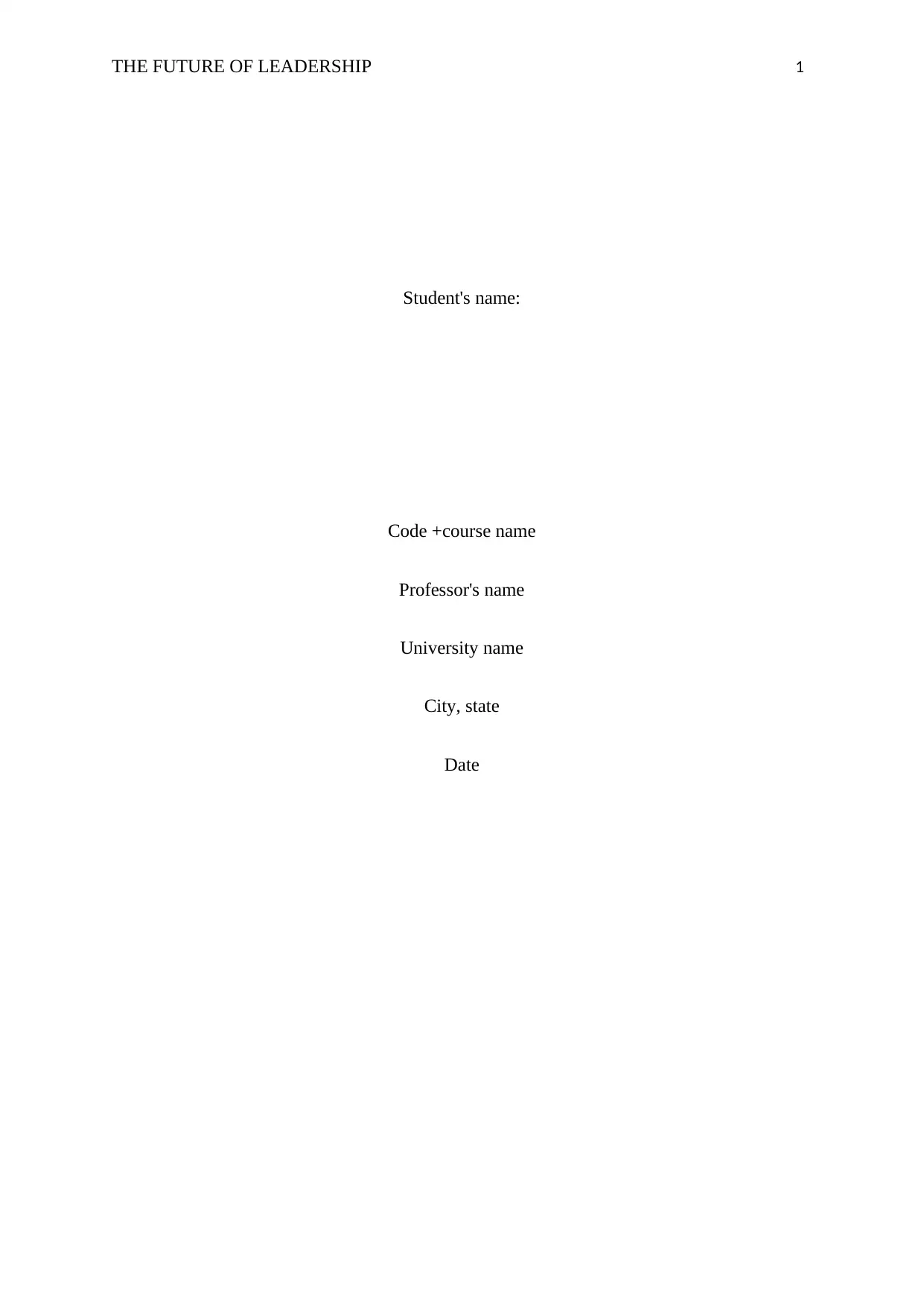
THE FUTURE OF LEADERSHIP 1
Student's name:
Code +course name
Professor's name
University name
City, state
Date
Student's name:
Code +course name
Professor's name
University name
City, state
Date
Paraphrase This Document
Need a fresh take? Get an instant paraphrase of this document with our AI Paraphraser
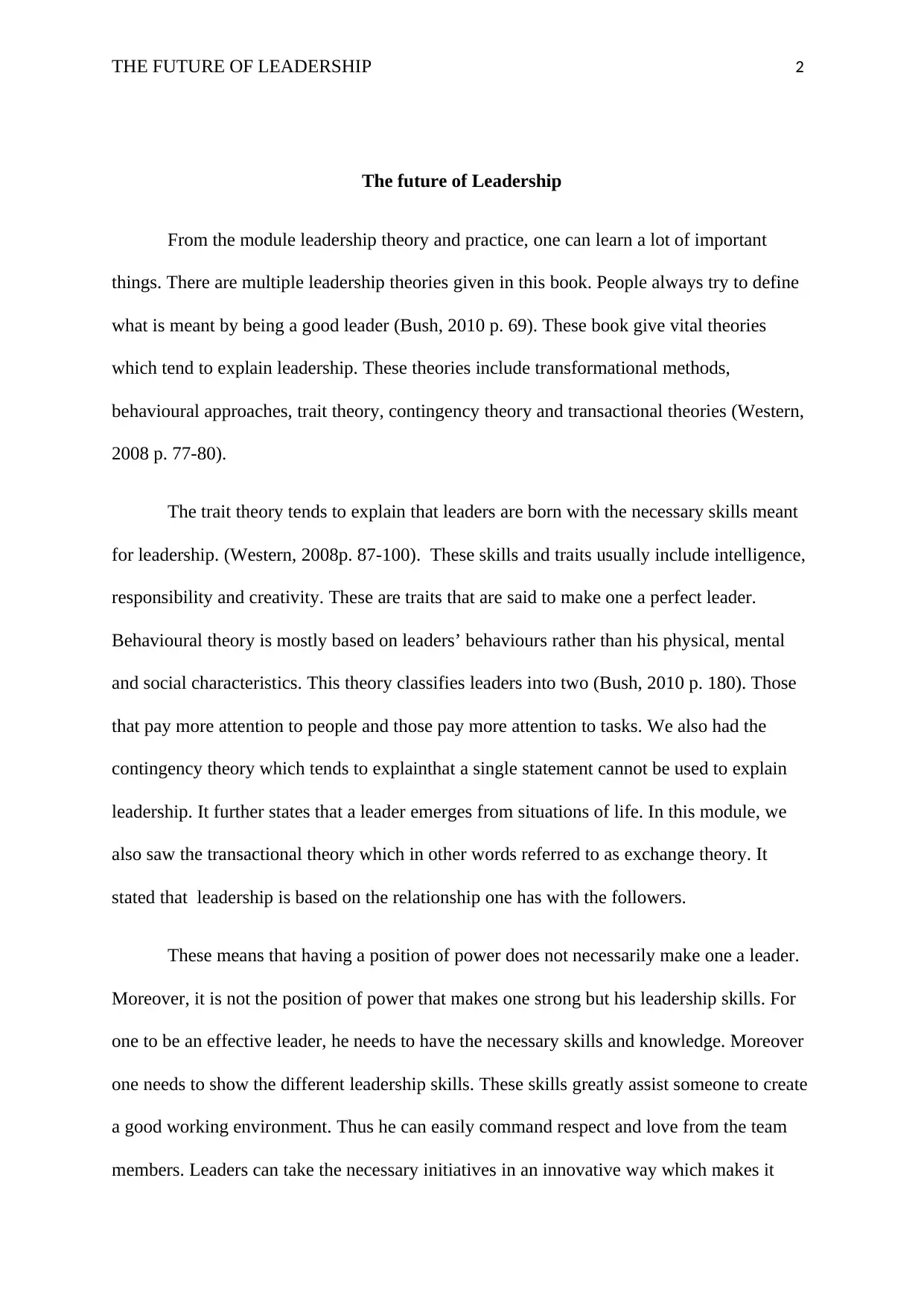
THE FUTURE OF LEADERSHIP 2
The future of Leadership
From the module leadership theory and practice, one can learn a lot of important
things. There are multiple leadership theories given in this book. People always try to define
what is meant by being a good leader (Bush, 2010 p. 69). These book give vital theories
which tend to explain leadership. These theories include transformational methods,
behavioural approaches, trait theory, contingency theory and transactional theories (Western,
2008 p. 77-80).
The trait theory tends to explain that leaders are born with the necessary skills meant
for leadership. (Western, 2008p. 87-100). These skills and traits usually include intelligence,
responsibility and creativity. These are traits that are said to make one a perfect leader.
Behavioural theory is mostly based on leaders’ behaviours rather than his physical, mental
and social characteristics. This theory classifies leaders into two (Bush, 2010 p. 180). Those
that pay more attention to people and those pay more attention to tasks. We also had the
contingency theory which tends to explainthat a single statement cannot be used to explain
leadership. It further states that a leader emerges from situations of life. In this module, we
also saw the transactional theory which in other words referred to as exchange theory. It
stated that leadership is based on the relationship one has with the followers.
These means that having a position of power does not necessarily make one a leader.
Moreover, it is not the position of power that makes one strong but his leadership skills. For
one to be an effective leader, he needs to have the necessary skills and knowledge. Moreover
one needs to show the different leadership skills. These skills greatly assist someone to create
a good working environment. Thus he can easily command respect and love from the team
members. Leaders can take the necessary initiatives in an innovative way which makes it
The future of Leadership
From the module leadership theory and practice, one can learn a lot of important
things. There are multiple leadership theories given in this book. People always try to define
what is meant by being a good leader (Bush, 2010 p. 69). These book give vital theories
which tend to explain leadership. These theories include transformational methods,
behavioural approaches, trait theory, contingency theory and transactional theories (Western,
2008 p. 77-80).
The trait theory tends to explain that leaders are born with the necessary skills meant
for leadership. (Western, 2008p. 87-100). These skills and traits usually include intelligence,
responsibility and creativity. These are traits that are said to make one a perfect leader.
Behavioural theory is mostly based on leaders’ behaviours rather than his physical, mental
and social characteristics. This theory classifies leaders into two (Bush, 2010 p. 180). Those
that pay more attention to people and those pay more attention to tasks. We also had the
contingency theory which tends to explainthat a single statement cannot be used to explain
leadership. It further states that a leader emerges from situations of life. In this module, we
also saw the transactional theory which in other words referred to as exchange theory. It
stated that leadership is based on the relationship one has with the followers.
These means that having a position of power does not necessarily make one a leader.
Moreover, it is not the position of power that makes one strong but his leadership skills. For
one to be an effective leader, he needs to have the necessary skills and knowledge. Moreover
one needs to show the different leadership skills. These skills greatly assist someone to create
a good working environment. Thus he can easily command respect and love from the team
members. Leaders can take the necessary initiatives in an innovative way which makes it
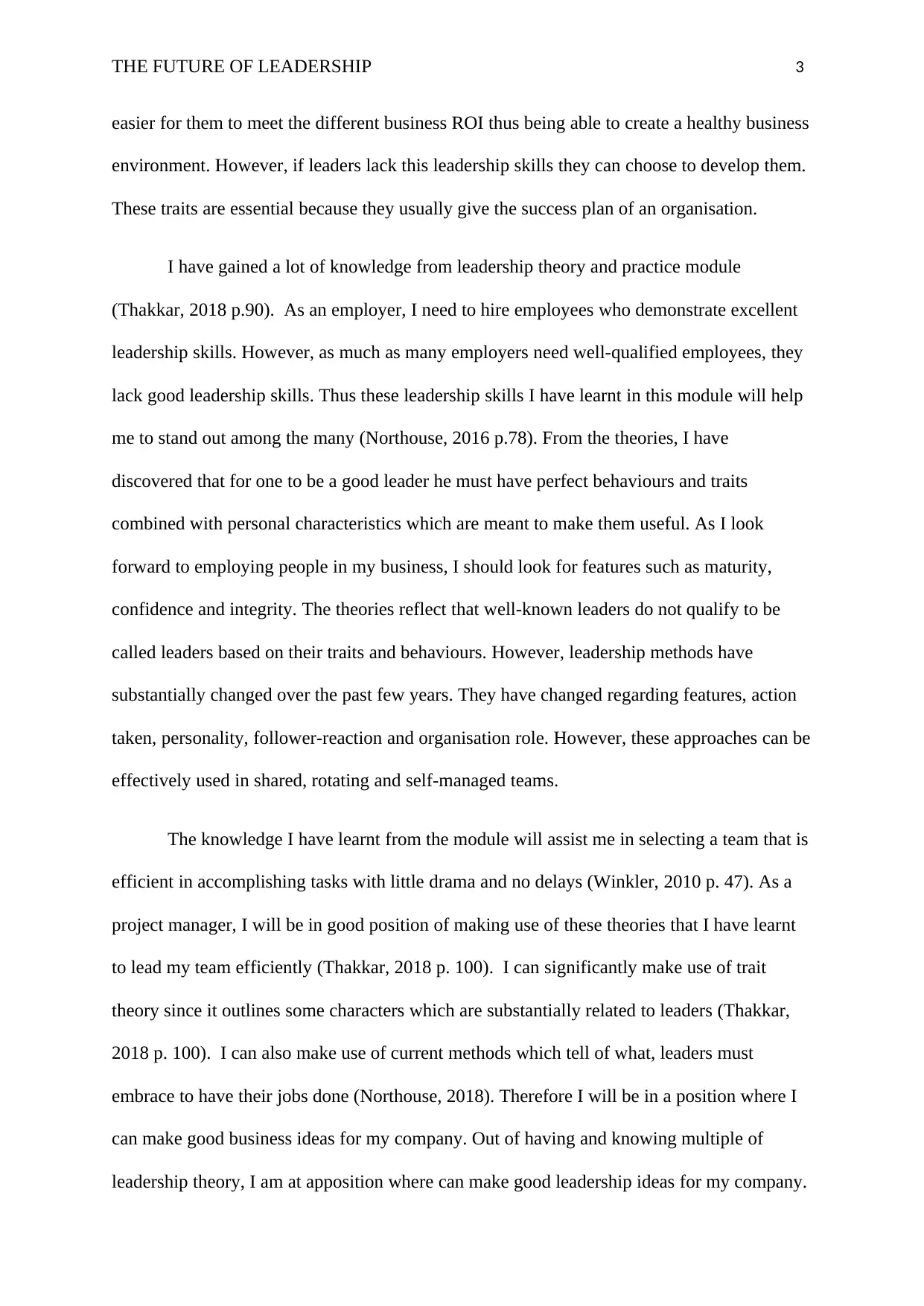
THE FUTURE OF LEADERSHIP 3
easier for them to meet the different business ROI thus being able to create a healthy business
environment. However, if leaders lack this leadership skills they can choose to develop them.
These traits are essential because they usually give the success plan of an organisation.
I have gained a lot of knowledge from leadership theory and practice module
(Thakkar, 2018 p.90). As an employer, I need to hire employees who demonstrate excellent
leadership skills. However, as much as many employers need well-qualified employees, they
lack good leadership skills. Thus these leadership skills I have learnt in this module will help
me to stand out among the many (Northouse, 2016 p.78). From the theories, I have
discovered that for one to be a good leader he must have perfect behaviours and traits
combined with personal characteristics which are meant to make them useful. As I look
forward to employing people in my business, I should look for features such as maturity,
confidence and integrity. The theories reflect that well-known leaders do not qualify to be
called leaders based on their traits and behaviours. However, leadership methods have
substantially changed over the past few years. They have changed regarding features, action
taken, personality, follower-reaction and organisation role. However, these approaches can be
effectively used in shared, rotating and self-managed teams.
The knowledge I have learnt from the module will assist me in selecting a team that is
efficient in accomplishing tasks with little drama and no delays (Winkler, 2010 p. 47). As a
project manager, I will be in good position of making use of these theories that I have learnt
to lead my team efficiently (Thakkar, 2018 p. 100). I can significantly make use of trait
theory since it outlines some characters which are substantially related to leaders (Thakkar,
2018 p. 100). I can also make use of current methods which tell of what, leaders must
embrace to have their jobs done (Northouse, 2018). Therefore I will be in a position where I
can make good business ideas for my company. Out of having and knowing multiple of
leadership theory, I am at apposition where can make good leadership ideas for my company.
easier for them to meet the different business ROI thus being able to create a healthy business
environment. However, if leaders lack this leadership skills they can choose to develop them.
These traits are essential because they usually give the success plan of an organisation.
I have gained a lot of knowledge from leadership theory and practice module
(Thakkar, 2018 p.90). As an employer, I need to hire employees who demonstrate excellent
leadership skills. However, as much as many employers need well-qualified employees, they
lack good leadership skills. Thus these leadership skills I have learnt in this module will help
me to stand out among the many (Northouse, 2016 p.78). From the theories, I have
discovered that for one to be a good leader he must have perfect behaviours and traits
combined with personal characteristics which are meant to make them useful. As I look
forward to employing people in my business, I should look for features such as maturity,
confidence and integrity. The theories reflect that well-known leaders do not qualify to be
called leaders based on their traits and behaviours. However, leadership methods have
substantially changed over the past few years. They have changed regarding features, action
taken, personality, follower-reaction and organisation role. However, these approaches can be
effectively used in shared, rotating and self-managed teams.
The knowledge I have learnt from the module will assist me in selecting a team that is
efficient in accomplishing tasks with little drama and no delays (Winkler, 2010 p. 47). As a
project manager, I will be in good position of making use of these theories that I have learnt
to lead my team efficiently (Thakkar, 2018 p. 100). I can significantly make use of trait
theory since it outlines some characters which are substantially related to leaders (Thakkar,
2018 p. 100). I can also make use of current methods which tell of what, leaders must
embrace to have their jobs done (Northouse, 2018). Therefore I will be in a position where I
can make good business ideas for my company. Out of having and knowing multiple of
leadership theory, I am at apposition where can make good leadership ideas for my company.
⊘ This is a preview!⊘
Do you want full access?
Subscribe today to unlock all pages.

Trusted by 1+ million students worldwide
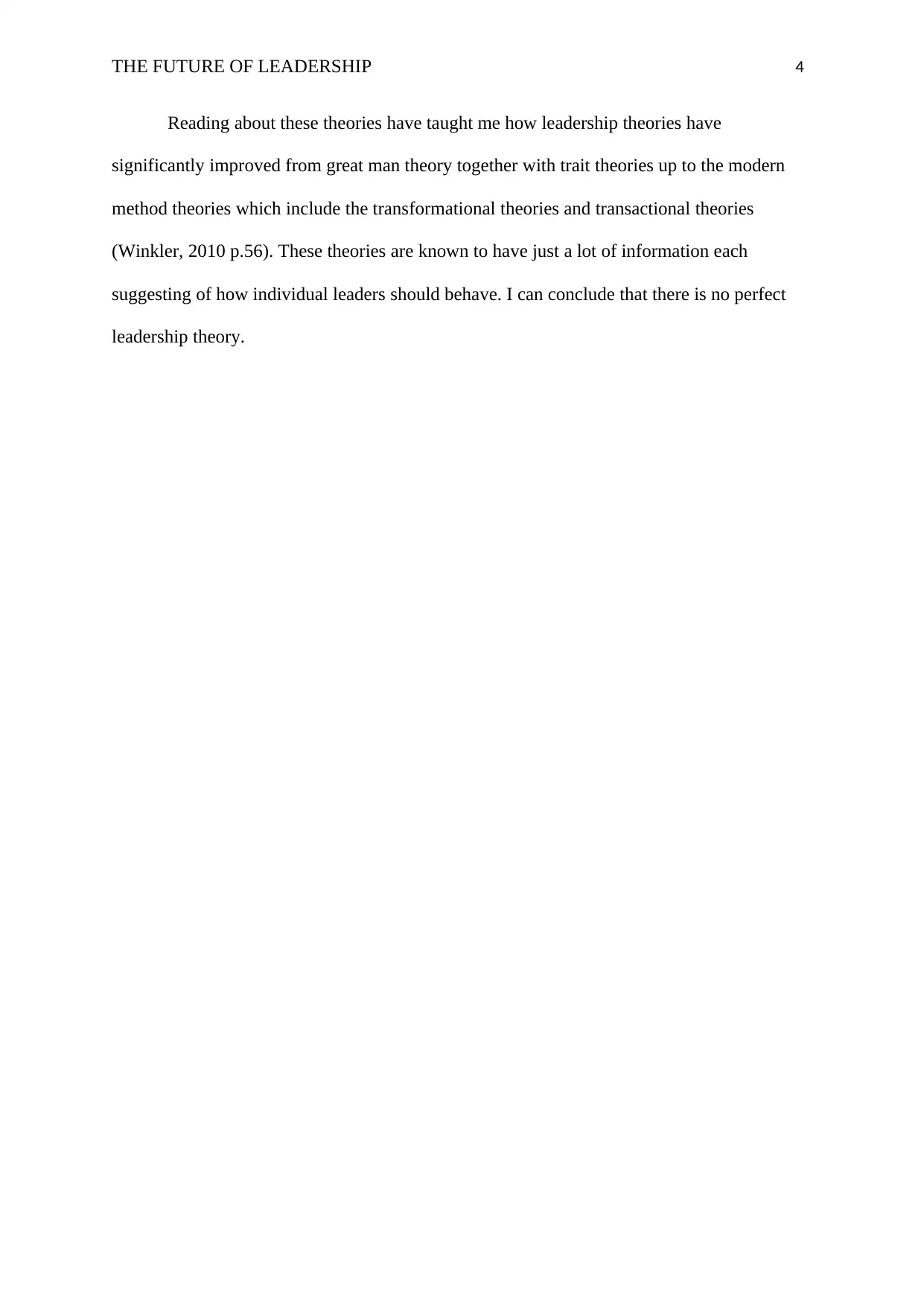
THE FUTURE OF LEADERSHIP 4
Reading about these theories have taught me how leadership theories have
significantly improved from great man theory together with trait theories up to the modern
method theories which include the transformational theories and transactional theories
(Winkler, 2010 p.56). These theories are known to have just a lot of information each
suggesting of how individual leaders should behave. I can conclude that there is no perfect
leadership theory.
Reading about these theories have taught me how leadership theories have
significantly improved from great man theory together with trait theories up to the modern
method theories which include the transformational theories and transactional theories
(Winkler, 2010 p.56). These theories are known to have just a lot of information each
suggesting of how individual leaders should behave. I can conclude that there is no perfect
leadership theory.
Paraphrase This Document
Need a fresh take? Get an instant paraphrase of this document with our AI Paraphraser
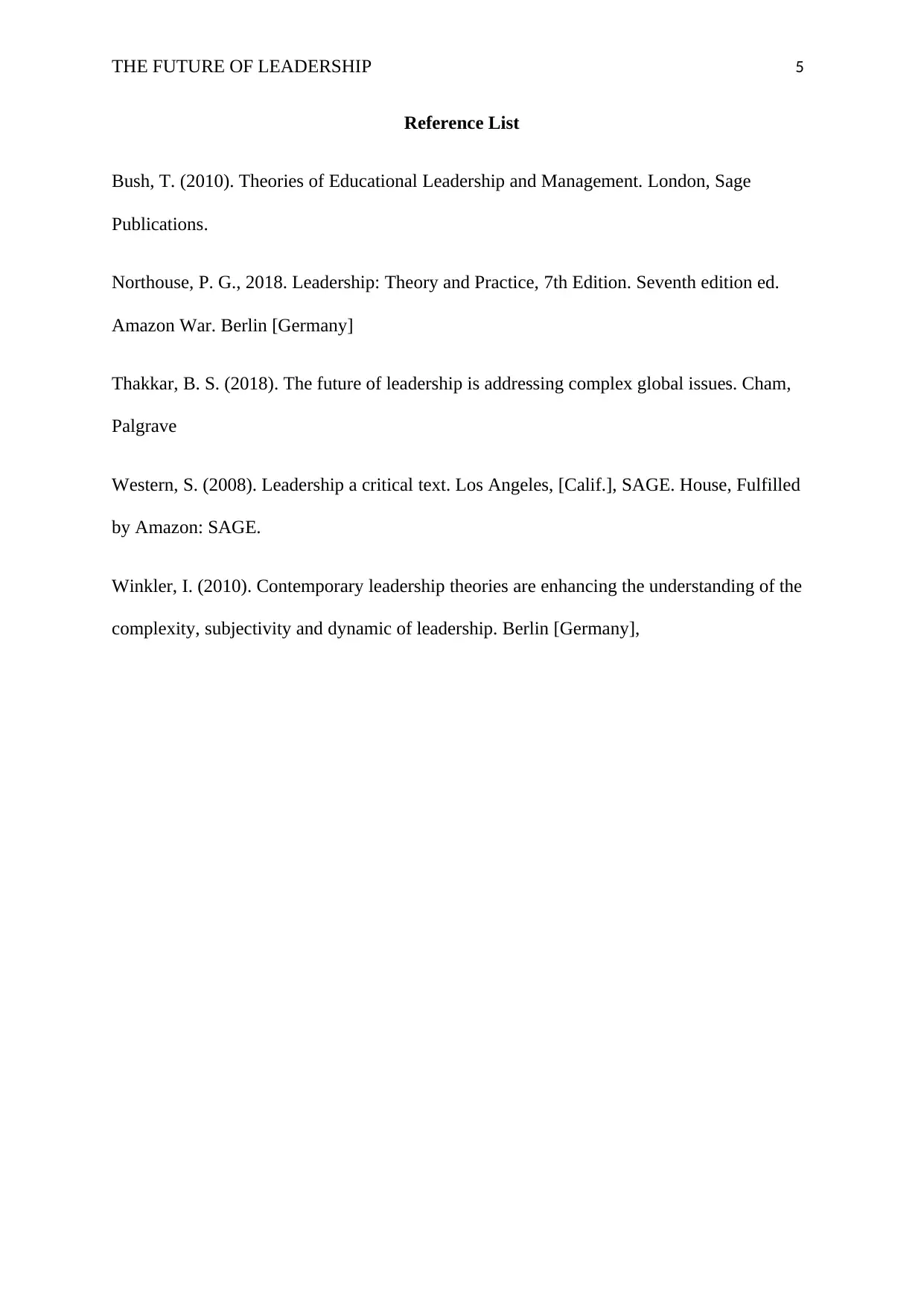
THE FUTURE OF LEADERSHIP 5
Reference List
Bush, T. (2010). Theories of Educational Leadership and Management. London, Sage
Publications.
Northouse, P. G., 2018. Leadership: Theory and Practice, 7th Edition. Seventh edition ed.
Amazon War. Berlin [Germany]
Thakkar, B. S. (2018). The future of leadership is addressing complex global issues. Cham,
Palgrave
Western, S. (2008). Leadership a critical text. Los Angeles, [Calif.], SAGE. House, Fulfilled
by Amazon: SAGE.
Winkler, I. (2010). Contemporary leadership theories are enhancing the understanding of the
complexity, subjectivity and dynamic of leadership. Berlin [Germany],
Reference List
Bush, T. (2010). Theories of Educational Leadership and Management. London, Sage
Publications.
Northouse, P. G., 2018. Leadership: Theory and Practice, 7th Edition. Seventh edition ed.
Amazon War. Berlin [Germany]
Thakkar, B. S. (2018). The future of leadership is addressing complex global issues. Cham,
Palgrave
Western, S. (2008). Leadership a critical text. Los Angeles, [Calif.], SAGE. House, Fulfilled
by Amazon: SAGE.
Winkler, I. (2010). Contemporary leadership theories are enhancing the understanding of the
complexity, subjectivity and dynamic of leadership. Berlin [Germany],
1 out of 5
Related Documents
Your All-in-One AI-Powered Toolkit for Academic Success.
+13062052269
info@desklib.com
Available 24*7 on WhatsApp / Email
![[object Object]](/_next/static/media/star-bottom.7253800d.svg)
Unlock your academic potential
Copyright © 2020–2026 A2Z Services. All Rights Reserved. Developed and managed by ZUCOL.




